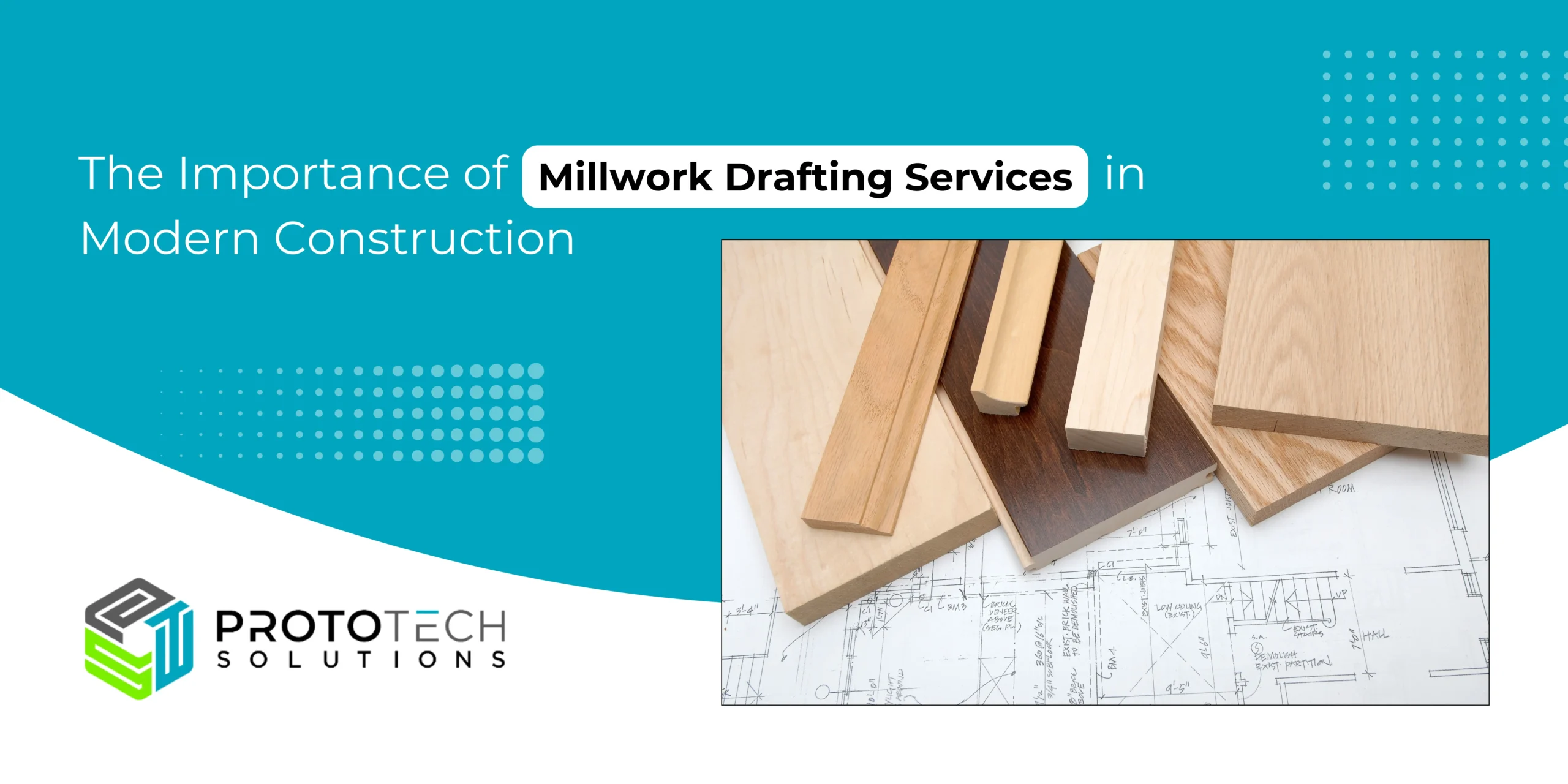The Importance of Millwork Drafting Services in Modern Construction
The Importance of Millwork Drafting Services in Modern Construction

Many construction techniques have remained unchanged for centuries. However, due to technological advancements and evolving job site demands, new methods are required to address modern building challenges. By harnessing digital design, innovative software, advanced automation, and precision robotics, modern construction techniques have rapidly transformed the construction industry.
The construction industry is indispensable to the economy, overseeing the full spectrum from initial planning to ongoing maintenance of diverse physical structures, including vital infrastructure, architectural marvels, and essential facilities. According to a recent market survey, the construction market was valued at USD 10436.02 billion in 2023 and is predicted to reach USD 16108.43 billion by 2030, with a CAGR of 5.9% from 2024 to 2030.
In the world of modern construction, precision and detail are paramount. From the towering skyscrapers that define city skylines to the intricate interior designs of luxury homes, every aspect of a building’s construction requires careful planning and execution. One crucial element that plays a significant role in achieving this precision is millwork drafting services. These services are indispensable in ensuring the highest standards of quality, functionality, and aesthetics in construction projects.
Understanding Millwork Drafting Services
Millwork refers to the custom woodwork and carpentry involved in construction, including cabinets, doors, windows, moldings, and other architectural features. Millwork drafting services involve creating detailed technical drawings and plans that guide the manufacturing and installation of these elements. These drafts are created by skilled drafters who use advanced software tools like AutoCAD, Revit, and others to produce precise and detailed drawings.
The Role of Millwork Drafting in Construction
- Precision and Accuracy: Modern construction projects demand a high level of precision. Millwork drafting ensures that every detail, from the dimensions of a cabinet to the intricate design of a custom molding, is accurately represented. This precision minimizes errors during manufacturing and installation, saving time and reducing costs.
- Customization and Personalization: Today’s construction projects often require unique and customized solutions to meet the specific needs and preferences of clients. Millwork drafting allows for the creation of bespoke designs tailored to individual tastes and requirements, enhancing the overall aesthetic and functional quality of the project.
- Collaboration and Coordination: Construction projects involve multiple stakeholders, including architects, engineers, contractors, and clients. Millwork drafting facilitates effective communication and collaboration among these parties by providing clear and detailed visual representations of the design. This ensures that everyone is on the same page, reducing misunderstandings and errors.
- Compliance and Standards: Construction projects must adhere to various building codes and standards. Millwork drafting ensures that all designs comply with these regulations, avoiding potential legal and safety issues. Drafters are knowledgeable about industry standards and incorporate them into their plans to ensure compliance.
- Efficiency and Cost-effectiveness: By providing detailed and accurate plans, millwork drafting helps streamline the manufacturing and installation processes. This efficiency reduces waste, lowers costs, and accelerates project timelines. In an industry where time is money, these savings are invaluable.
The Process of Millwork Drafting
- Initial Consultation and Conceptualization: The process begins with an initial consultation between the drafter and the client. During this phase, the client’s needs, preferences, and budget are discussed. The drafter gathers information about the project’s scope, including measurements, design ideas, and any specific requirements. This phase is crucial for understanding the client’s vision and setting the foundation for the drafting process.
- Creating Preliminary Drafts: Based on the information gathered during the consultation, the drafter creates preliminary drafts. These drafts are initial representations of the design, providing a visual overview of the proposed millwork. The preliminary drafts serve as a starting point for further discussions and refinements.
- Refinement and Detailed Drafting: After reviewing the preliminary drafts with the client and other stakeholders, the drafter makes necessary adjustments and refinements. This phase involves creating detailed technical drawings that include precise measurements, materials, finishes, and other specifications. Advanced software tools are used to ensure accuracy and clarity in these drawings.
- Review and Approval: The detailed drafts are then presented to the client and other relevant parties for review and approval. This step is critical for ensuring that the design meets the client’s expectations and complies with all necessary standards and regulations. Any final adjustments are made based on feedback received during this review.
- Manufacturing and Installation Support: Once the drafts are approved, they serve as the blueprint for the manufacturing and installation processes. The detailed drawings guide the production of the millwork components, ensuring that they are built to exact specifications. During installation, the drafts provide a reference for ensuring that everything fits and functions as intended.
The Benefits of Professional Millwork Drafting Services
Engaging professional millwork drafting services offers numerous benefits to construction projects:
- Enhanced Quality and Aesthetics: Professional drafters have the expertise and experience to create high-quality designs that enhance the aesthetic appeal and functionality of a project. Their attention to detail ensures that every element is crafted to perfection, resulting in a superior finished product.
- Time and Cost Savings: By minimizing errors and ensuring efficient manufacturing and installation processes, professional millwork drafting services save time and reduce costs. These savings can be significant, particularly in large and complex construction projects.
- Increased Flexibility and Customization: Professional drafters can accommodate a wide range of design preferences and requirements, providing clients with greater flexibility and customization options. This ability to tailor designs to specific needs is particularly valuable in high-end residential and commercial projects.
- Improved Coordination and Communication: Detailed and accurate drafts facilitate better communication and coordination among project stakeholders. This improves the overall efficiency of the project, reducing the likelihood of delays and misunderstandings.
- Compliance with Standards and Regulations: Professional millwork drafters are well-versed in industry standards and building codes. Their expertise ensures that all designs comply with relevant regulations, avoiding potential legal and safety issues.
How Can Outsource CAD Drafting Services Transform Your Millwork Shop Drawings?

Outsourced CAD drafting services significantly enhance millwork shop drawings by providing expert precision and efficiency. These services offer access to skilled drafters who specialize in millwork, ensuring high-quality, detailed, industry standards and building codes, and accurate drawings. Outsourcing saves time and reduces costs associated with in-house drafting, allowing millwork companies to focus on core business activities. With advanced AutoCAD, Revit software, and adherence to industry standards, outsourced CAD services facilitate quicker turnaround times, seamless project scalability, and improved communication with architects and builders, ultimately leading to better project outcomes and client satisfaction.
Conclusion
As technology continues to evolve, millwork drafting will become even more integral to the construction industry. The integration of advanced technologies like BIM and 3D printing promises to further enhance the precision, efficiency, and capabilities of millwork drafting services. For construction professionals and clients alike, investing in professional millwork drafting services is a smart and valuable choice that contributes to the success and excellence of any construction project.
Professional millwork drafting enhances the quality and aesthetic appeal of buildings, saving time and costs while providing greater flexibility and customization options.

